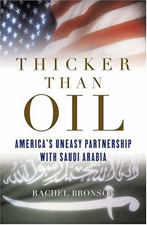Book Review: "Thicker than Oil: America's Uneasy Partnership with Saudi Arabia" by Rachel Bronson (2006)

This tome by Council on Foreign Relations scholar Rachel Bronson is intended to serve as a counterweight to more cloak-and-dagger, conspiratorial books on American-Saudi relations like Craig Unger's "House of Bush, House of Saud", written largely for a popular audience. owever, in so doing, it loses its appeal to the lay reader as it is overly academic, especially for the first 140 pages or so. (It reminded me of a trick I used during my days as a political science undergraduate to fluff up the length of my essays, which was to recount history in eye-glazing, mind-numbing detail.) Around that mark, though, things get very interesting as the Saudi machinations around the 1967 Middle East war are recounted, leading to their role in the OPEC crisis of the early 1970s.
Moving forward, the rise of Wahabbism in the wake of the Iranian Revolution in 1979 and the role Saudi Arabia played in promoting it as a sort of devil's bargain to secure their own place in power is retold as is the alliance between the Taliban and Saudi Arabia in fighting the "godless" Communists in Afghanistan. What struck me in reading this is that much discussion today about the modern history of the Middle East and all of the hypocrisy, double standards, etc. that seemed to involve US foreign policy in the region, especially during the 80s, omits (or underplays) the importance of the Cold War as a primary consideration, one which was head and shoulders above everything else at the time. None of these periods were without their challenges for American policymakers in relation to Saudi Arabia.
One thing is certain ... when dealing with the Middle East and the politics of oil security, it is foolhardy to hold either one side or the other to an absolute standard of ethical conduct or integrity because to do so would be sacrificing pragmatism and realism in exhange for righteousness, which, at the end of the day, won't get you very far. That being said, this book reveals that not only is the US-Saudi relationship is far more complex than usually portrayed (usually for partisan purposes), and also, that American conduct hasn't been nearly as sinister as some would have us believe - none of which changes the fact that energy self-sufficiency is fundamental to ensuring national security going forward, especially if we keep (unnecessarily) purchasing SUVs without a care about how much of our gas dollar ends up in the hands of al-Qaeda in a trade-off to protect the privilege of the Saudi royal family.
(Then again, better the devil you know, right?)
Ratings:
First 140 pages: 4.5/10
Final 160 pages: 8.5/10
Overall: 6.75/10

0 Comments:
Post a Comment
<< Home